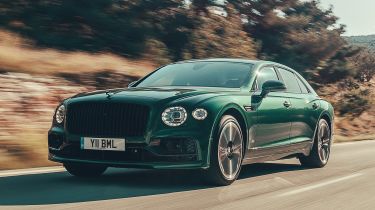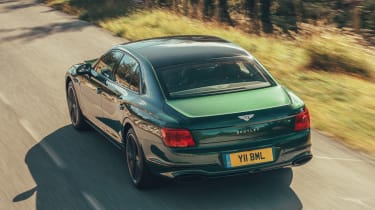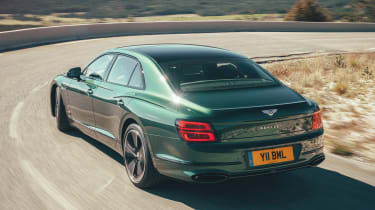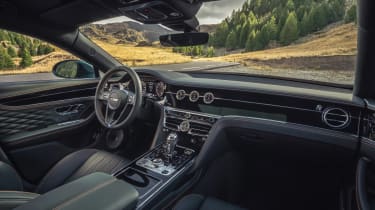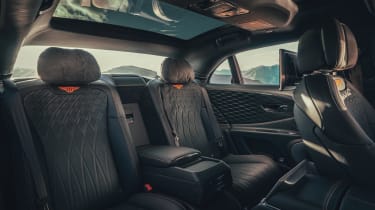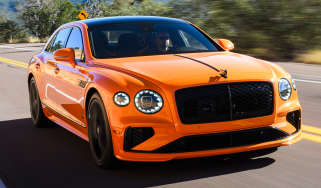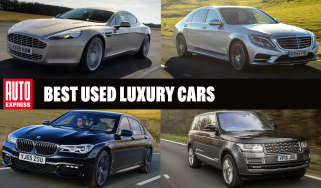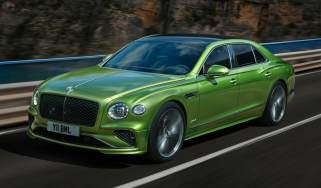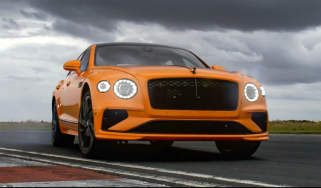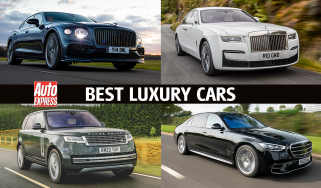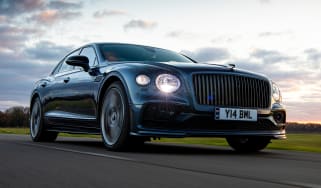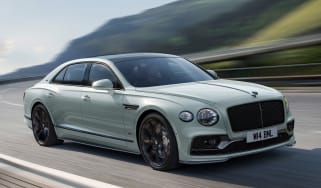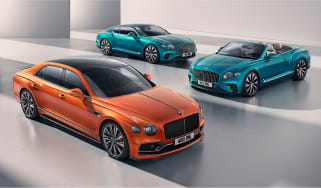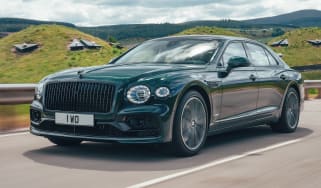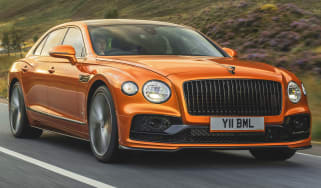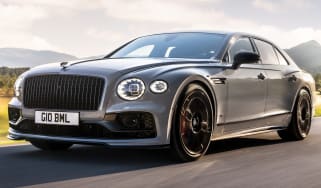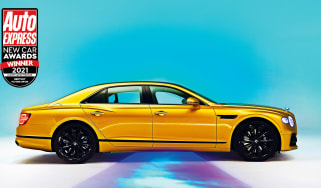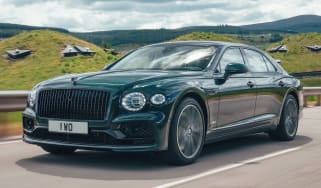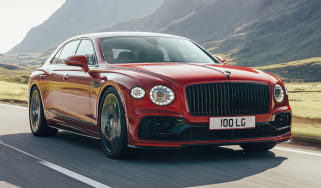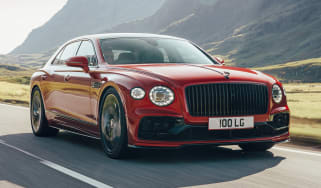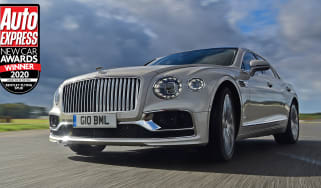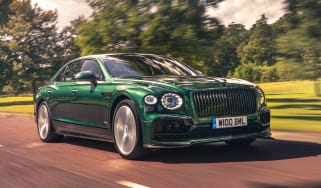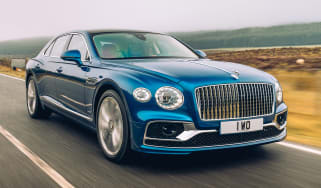Bentley Flying Spur (2019-2024) review
Hand-built Bentley Flying Spur luxury saloon combines breathtaking performance with majestic luxury and refinement

The Bentley Flying Spur is the brand's ‘small’ four-door limousine. It uses an extended version of the Continental GT coupe’s platform, so it comes with four-wheel drive and Bentley’s 6.0-litre W12 engine. Predictably then, performance is stunning – this two-tonne-plus saloon delivers a sub-four second 0-62mph time and a top speed of 207mph. The V8 model, due to its lighter engine and lower overall weight, is only a few tenths behind on the benchmark sprint, while there's also a V6 plug-in hybrid model to help ease any unlikely concerns over running costs.
As with all Bentleys, the Flying Spur is beautifully finished inside with the finest wood and leather trim, so occupants can be carried in absolute comfort at high speeds. The downsides? Well, prices start from over £150,000 and running costs are very high.
About the Bentley Flying Spur
Bentley originally revived the Continental Flying Spur name back in 2005 as a four-door version of the Continental GT coupe, with a second-generation model revealed in 2013 simply named the Flying Spur. The third chapter in the model’s history is an all-new version of the four-door grand tourer, redesigned from the ground up, with Bentley stating it has made a quantum leap in performance, comfort and innovation. The wheelbase has been extended by 130mm, moving the front axle further forward and projecting a more athletic stance.
More reviews
In-depth reviews
Road tests
At over five-metres long, and with the top-of-the-range car sporting a twin-turbocharged 6.0-litre W12 power unit, the new Flying Spur is probably not for the shy and retiring type. It exists in a marketplace that includes such luminaries as the Rolls Royce Ghost and the Mercedes-Maybach S600, so has to offer a unique driving experience that ensures it stands out from its illustrious competitors.
Bentley has remained steadfast in its determination to offer limousine levels of refinement, with a driver-focused cabin that adds new levels of technology, connectivity and sportiness. The Flying Spur features all-wheel steering, a first for a Bentley, and active-all-wheel drive. The 4x4 system normally delivers power to the rear axle but depending on road conditions and wheel slip, will automatically send drive to the front axle as required. Drive from the engine is routed through the same eight-speed auto gearbox from the Continental GT.
The Flying Spur lineup now includes the choice of either a W12 engine, a V8 unit, or a V6 plug-in hybrid model, as Bentley concentrates on meeting its target of introducing an electrified variant in every one of its model ranges by 2023.
The exterior panels on the Flying Spur are all-aluminium and have been crafted with crisp lines along the flanks. These are intended to enhance the elegant look, but ensure the car remains imposing and purposeful-looking. As a result of such engineering, the new Flying Spur is actually 38kg lighter overall than the previous-generation model, despite being laden with new tech and indulgent touches.
Engines, performance and drive
The Flying Spur turns in to corners more keenly than the old car thanks in part to the relocated front axle, which means the engine is now mostly behind the front wheels. The new rear-biased four-wheel-drive system helps, too; unlike the old Flying Spur, which had a 60:40 power split front to rear, the new one only sends power forwards when slip is detected.
On a motorway cruise, the most audible sound comes from the whirring fans inside the ventilated seats. Despite the tyres measuring up to 315mm wide at the rear, road noise is a distant hum.
Ride comfort is controlled via a three-stage air suspension set-up and the Bentley Dynamic Ride System – the latter comprising an active anti-roll bar that keeps the body level when cornering. In Comfort mode it means that the Flying Spur smothers almost any road imperfections the cratered British road network can throw at it.
Make no mistake, the W12 Flying Spur is a handsome but heavy beast of a car, weighing in at over 2,400kg. The V8 model manages to shave around 100kg off this total and actually feels more engaging for it. With less weight over the front end, coupled with suspension and steering tweaks, it delivers the more agile drive of the two variants.
Rotate the drive mode dial to Sport, and the body starts to jiggle about slightly, but it also lets the Flying Spur corner with a level of composure that no two-and-a-half tonne limousine has any right to. A new four-wheel steering system helps to mask at least some of the mass at speed, as well as its length during low-speed manoeuvres. The steering hasn’t much feel, but the pleasing weight of response seems appropriate for such a substantial car. The best compromise is Bentley mode though, which strikes a great balance between Sport and Comfort.
Engines, 0-60 acceleration and top speed
The Flying Spur comes with the choice of three immensely capable engines: a twin-turbocharged 6.0-litre W12, which makes 626bhp and a staggering 900Nm of torque, a 4.0-litre V8 unit producing a not insignificant 542bhp and 770Nm, or a V6 plug-in hybrid with 536bhp and 750Nm.
Jab the throttle, and the 12-cylinder unit gives off a tuneful growl – somewhere between the high pitched wail of a Ferrari and the bassy thunder of an Aston Martin V12. Get over the slight turbo lag, and the 3.8-second 0-62mph time is completely believable. The eight-speed auto gearbox, meanwhile, responds quickly enough in manual mode, and is near-imperceptible the rest of the time.
The V8 engine has a more aggressive exhaust note at idle, which Bentley says is intentional due to it being engineered to be the more engaging of the two to drive. A drag race between the V8 and W12 models could prove to be very interesting, as the V8 model is only three tenths of a second slower to 62mph, while the claimed top speed is 198mph. The V6 plug-in hybrid doesn't disgrace itself, though, as it manages 0-62mph in 4.3 seconds.
MPG, CO2 and running costs
Let’s face it: if you can afford a car like the Flying Spur, then fuel economy isn’t going to be your top concern. Officially, the Flying Spur W12 achieves 19.1mpg and emits 337g/km of CO2. Not a choice for the environmentally conscious, then, but still lower than the emissions of a Rolls-Royce Ghost. The V8 model manages a claimed 24.4mpg, with CO2 emissions of 270g/km.
For those buyers who are keen to choose a greener Flying Spur, then the plug-in hybrid model is the version to go for. The manufacturer is yet to confirm overall economy and CO2 figures, but with an all-electric range of around 25 miles, the PHEV will be particularly useful on shorter journeys, where you'd otherwise struggle to achieve 20mpg.
Insurance groups
Insurance data is not available for the new Flying Spur, but it’s certainly going to be expensive - at the top-end of group ratings.
Depreciation
With a costly list price, the Flying Spur will no doubt lose a hefty chunk of its value over three years - around 35 per cent on average.
Interior, design and technology
The exterior styling, though familiar, has added purpose and extra muscle, mainly due to the sweeping lines that run the full length of the car. The increased wheelbase and shorter front overhang also emphasise the model’s pretensions of not just being a luxury limo, but a genuine sports GT to boot.
Then there’s the detailing. Close-up, the jewel-like Matrix LED headlights look stunning, while those at the back give off a sharp B-shaped lighting signature. The new retractable ‘Flying B’ adorning the bonnet, can be fitted with 23 crystal ‘feathers’ in its wings, if you feel the need, while arch-filling 21-inch wheels are standard with 22-inch items for the exclusive Mulliner versions.
Inside, the cabin is as luxurious as you’d expect, with deep carpets, soft leather and beautifully finished trim. Aside from the new centre console and air vents, the dashboard design is lifted straight from the Continental GT. That’s no bad thing though, because this must be one of the finest interiors fitted to any new car on sale today.
Chromed organ stop controls for the air vents look delicate yet feel sturdy, the knurled driving select dial rotates with a near-mechanical ‘thunk’, and the three-dimensional quilted leather reinforces the feeling of attention to detail applied to every surface. When it comes to craftsmanship and sheer panache, the Bentley’s interior certainly feels bespoke rather than off-the-peg.
Sat-nav, stereo and infotainment
Bentley has managed to incorporate a host of premium tech into the Flying Spur’s cabin without compromising the classy, hand-crafted feel. The huge 12.3-inch touchscreen display houses functionality for navigation, Bluetooth, DAB radio and Apple CarPlay, but if you find it all a bit fussy, it will rotate round into the dash, displaying simple analogue dials or, with a further turn, just a plain section of trim.
The standard audio system offers 10 speakers with 650 watts, although you can upgrade to either a B&O 16 speaker set-up, or the ‘Naim for Bentley’ audio which provides 19 speakers, and a 2,200 watt output.
Move into the back, and the gloriously comfortable seats – electrically adjustable, naturally – give access to the Bentley rear-seat entertainment system. This adds a pair of Android-powered tablets to the rear of each front seat, giving access to web browsing, movies and music. There’s also a touchscreen remote for those in the back, allowing occupants to adjust climate control settings, monitor their driver’s speed and, in a fun (yet slightly juvenile) addition, reveal or conceal the Flying B on the bonnet.
Practicality, comfort and boot space
The Flying Spur is a big car. Three people can sit in the rear, but the middle passenger isn’t going to feel overly comfortable. When there are only two rear passengers, the centre headrest can be stowed to enhance visibility for the driver, while all occupants get their own climate controls, and there’s an optional rear entertainment system. There’s lots of convenient storage areas, with device charging areas available throughout and additional wireless charging offered in the front.
An optional tilt-and-slide panoramic sunroof is offered in combination with electric Alcantara blinds, color-matched to the interior. A new function in the Touch Screen Remote allows all the rear cabin and sunroof blinds to be closed or opened simultaneously with one touch.
Size
The Flying Spur is just over 5.3 metres in length, slightly shorter than the Ghost and S600, with width pretty similar across all three competitors. The Bentley has the lowest roof line - in keeping with its new design philosophy and adding to a sleeker, sportier feel.
Legroom, head room and passenger space
If you’re being chauffeured around in the Flying Spur, then the best seat to take up in the rear is behind the front passenger seat. With the front seat positioned forward, there is acres of space to relax in. Either way, head and knee room aren't exactly compromised, and space for even the tallest passenger shouldn’t be an issue, although a third rear occupant will not benefit from the same luxurious seating arrangement and almost has to perch in the middle berth.
Boot
Boot space isn’t great at 420 litres, lagging behind the Rolls Royce Ghost and Mercedes-Maybach S600. The actual opening is a reasonable size, but the fridge for the rear passengers takes up vital storage and there is a high lip which makes removing luggage a little more awkward.
Reliability and Safety
Bentley doesn’t tend to appear in our Driver Power customer satisfaction survey, but suffice to say the brand prides itself on producing high-quality, hand-crafted products and should respond accordingly to any issues with vehicles.
EuroNCAP almost certainly won’t be testing the Flying Spur, but standard safety kit includes Exit Warning, Blind Spot Warning, Traffic Sign Recognition, City Assist, Pedestrian Warning and Rear-Crossing Traffic Warning systems. This, coupled with the fact that certain underpinnings are shared with the Porsche Panamera, should inspire confidence in the Flying Spur’s safety credentials.
Warranty and servicing
Bentley offers a three-year unlimited mileage warranty, and requires an authorised repairer to carry out any necessary work. All genuine Bentley parts come with a 2-year comprehensive warranty.

